Ccrn test 2025 - Study guides, Class notes & Summaries
Looking for the best study guides, study notes and summaries about Ccrn test 2025? On this page you'll find 31 study documents about Ccrn test 2025.
Page 3 out of 31 results
Sort by
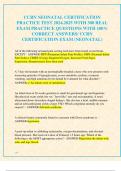
-
CCRN CERTIFICATION PRACTICE EXAMS (CCRN ADULT, CCRN PEDIATRICS & CCRN NEONATAL) 2024/2025 LATEST TEST BANK WITH REAL EXAM PRACTICE QUESTIONS AND CORRECT ANSWERS FOR THE CCRN CERTIFICATION TESTS 2024/2025
- Package deal • 3 items • 2024
-
- $40.99
- + learn more
CCRN CERTIFICATION PRACTICE EXAMS (CCRN ADULT, CCRN PEDIATRICS & CCRN NEONATAL) 2024/2025 LATEST TEST BANK WITH REAL EXAM PRACTICE QUESTIONS AND CORRECT ANSWERS FOR THE CCRN CERTIFICATION TESTS 2024/2025
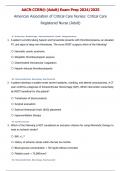
-
Master the AACN CCRN® (Adult) Exam with Our Comprehensive Practice Questions
- Exam (elaborations) • 8 pages • 2024
-
- $18.99
- + learn more
Prepare for the AACN CCRN® (Adult) exam with confidence and excel in your nursing career with the comprehensive "AACN CCRN® (Adult) Exam Prep 2024/2025" study guide. This meticulously designed resource is tailored to help critical care nurses excel in their pursuit of the American Association of Critical Care Nurses (AACN) certification. Covering an extensive range of topics, including cardiovascular, respiratory, endocrine, gastrointestinal, renal, and multisystem disorders, this guide ...
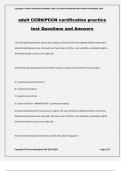
-
adult CCRN/PCCN certification practice test Questions and Answers
- Exam (elaborations) • 23 pages • 2024
-
- $12.49
- + learn more
adult CCRN/PCCN certification practice test Questions and Answers One day following posterior spinal fusion surgery a 35 year old female suddenly exhibits restlessness, labored breathing and acute chest pain. Her heart rate is 122/min., she is afebrile, and exhibits slightly diminished breath sounds on the right side. The findings described above should lead the nurse to suspect that the patient has developed: A. A spontaneous pneumothorax B. A pulmonary embolus C. Aspiration pneumonia ...
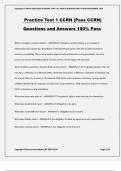
-
Practice Test 1 CCRN (Pass CCRN) Questions and Answers 100% Pass
- Exam (elaborations) • 19 pages • 2024
- Available in package deal
-
- $12.49
- + learn more
Practice Test 1 CCRN (Pass CCRN) Questions and Answers 100% Pass What is vasogenic cerebral edema? - ANSWER-Vasogenic cerebral edema is an increase in extracellular fluid caused by a breakdown of the blood-brain barrier with the resultant increase in vascular permeability. This cerebral edema begins locally and becomes more generalized. Common causes are trauma (including surgical trauma), tumors, hemorrhage, and abscesses What ventilator parameter indicates fluid volume excess? - ANSWER-A...
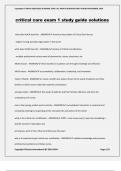
-
critical care exam 1 study guide solutions
- Exam (elaborations) • 15 pages • 2024
-
- $12.49
- + learn more
critical care exam 1 study guide solutions what does AACN stand for - ANSWER-American Association of Critical Care Nurses - largest nursing specialty organization in the world what does SCCM stand for - ANSWER-Society of Critical Care Medicine - multiple professional society made of pharmacists, nurses, physicians, etc AACN mission - ANSWER-drive excellence in patient care through knowledge and influence AACN values - ANSWER-accountability, collaboration, leadership, and innovation Vision...
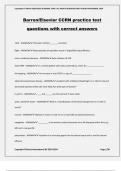
-
Barron/Elsevier CCRN practice test questions with correct answers
- Exam (elaborations) • 30 pages • 2024
- Available in package deal
-
- $12.49
- + learn more
Barron/Elsevier CCRN practice test questions with correct answers ADH - ANSWER-Phenytoin inhibits _______ secretion Right - ANSWER-Most episodes of aspiration result in (right/left) lung infiltrates. urine creatinine clearance - ANSWER-Best indicator of GFR Auto-PEEP - ANSWER-In a vented patient with status asthmaticus, check for _______________ Air trapping - ANSWER-An increase in auto-PEEP is a sign of _________________. obstructive pulmonary disease - ANSWER-A patient with a flattened ...
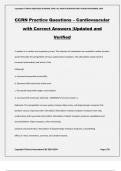
-
CCRN Practice Questions – Cardiovascular with Correct Answers |Updated and Verified
- Exam (elaborations) • 35 pages • 2024
- Available in package deal
-
- $13.49
- + learn more
CCRN Practice Questions – Cardiovascular with Correct Answers |Updated and Verified A patient is in cardiac and respiratory arrest. The selection of medications to reestablish cardiac function would stimulate the sympathetic nervous system beta1 receptors. This stimulation would result in increased automaticity and which of the following? a. Increased myocardial contractility b. Decreased left ventricular stroke work c. Decreased myocardial oxygen consumption d. Increased left ventri...
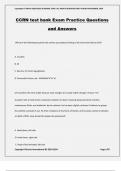
-
CCRN test bank Exam Practice Questions and Answers
- Exam (elaborations) • 97 pages • 2024
- Available in package deal
-
- $13.49
- + learn more
CCRN test bank Exam Practice Questions and Answers Which of the following would be the earliest auscultatory finding in left ventricular failure (LVF)? A. Crackles B. S3 C. Murmur of mitral regurgitation D. Pericardial friction rub - ANSWER-B. S3 LVF would be the most subtle because early changes are usually subtle changes. Choose "S3." A patient with a triple-lumen subclavian catheter has been receiving total parenteral nutrition, maintenance fluids, and antibiotics by the cathet...
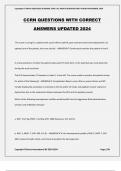
-
CCRN QUESTIONS WITH CORRECT ANSWERS UPDATED 2024
- Exam (elaborations) • 39 pages • 2024
- Available in package deal
-
- $13.49
- + learn more
CCRN QUESTIONS WITH CORRECT ANSWERS UPDATED 2024 The nurse is caring for a patient with acute inferior wall MI, post-coronary artery stent deployment, For optimal care of the patient, the nurse should: - ANSWER-Continuously monitor the patient in lead II It is best practice to monitor the patient status post PCI with stent, in the lead that was most abnormal during the acute occlusion. The ECG demonstrates ST elevation in leads II, III and aVF. The nurse needs to monitor the patient closel...
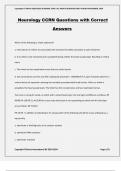
-
Neurology CCRN Questions with Correct Answers
- Exam (elaborations) • 21 pages • 2024
- Available in package deal
-
- $12.49
- + learn more
Neurology CCRN Questions with Correct Answers Which of the following is a false statement? a. head injuries in infants are associated with increased mortality secondary to open fontanels. b. if an infant is not restrained and is propelled during a MVA, the head usually leads. Resulting in critical injury c. The infant has less myelinated nerves that are easily injured. d. the cranial bones are thin and offer inadequate protection - ANSWER-A, open fontanels allow for a certain decree of e...

How much did you already spend on Stuvia? Imagine there are plenty more of you out there paying for study notes, but this time YOU are the seller. Ka-ching! Discover all about earning on Stuvia


